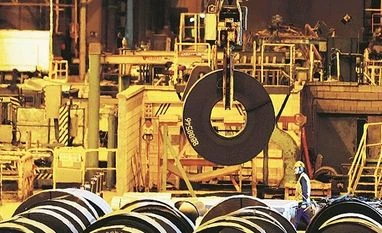Amid the ongoing electric vehicle (EV) frenzy, when India’s auto sales for the June quarter have hit the worst in almost two decades, domestic flat steel producers have turned jittery over how demand would pan out.
“I am seeing a bigger disruption via platform economy and what it means to the auto industry in this country,” T V Narendran, chief executive officer and managing director of Tata Steel, told Business Standard.
“As more and more Ubers, Olas and such options come up, the younger generation is not going to find the need to own a vehicle. That, to me is, a bigger impact than the EVs,” added Narendran.
India’s passenger vehicle sales dropped the most in almost two decades in the June quarter on the back of weak consumer sentiment, slowdown in economic activity, farm distress, and liquidity squeeze.
The total sales of cars, sport utility vehicles, and vans in the period under review declined 18.4 per cent year-on-year, the sharpest since a 23.1 per cent drop in the third quarter of 2000-01. Every segment of the auto industry reported a double-digit decline.
Flat and long steel products are two categories which find application in the auto and infrastructure sectors, respectively. In India, Tata Steel, Essar Steel, and Sajjan Jindal-led JSW Steel are flat steel producers, while state-owned Steel Authority of India and Jindal Steel & Power are into long products.
In the Budget for 2019-20, Union Finance Minister Nirmala Sitharaman laid out a plan to make the country a manufacturing hub for electric cars. As part of this, the government will allocate funds for building infrastructure and provide tax exemptions to buyers for encouraging the purchase of electric cars. Also, manufacturers have been assured of Customs duty exemptions for importing EV parts for manufacturing.
Domestic flat steel producers are trying to make up for the shrunk automobile market by diverting products towards alternative segments such as renewables, oil and gas, and structural steel for pre-engineering, among others.
“There is some balancing happening in other segments like solar appliances, but some impact is definitely there (due to drop in car sales) for sure. Not all of it can be mitigated,” said Jayant Acharya, director (commercial and marketing) at JSW Steel.
According to the joint plant committee data, India has a total flat steel capacity of 56.4 million tonnes (mt). Of this, a significant contribution comes from secondary producers along with large steel companies such as JSW Steel, Tata Steel, and Essar Steel. Demand for flat steel in 2018-19, however, stood at 44.39 mt.
Industry officials said the current dull demand situation will continue through August, but is towards the end of the cycle. “Ahead of the festive season, restocking and production of flat steel will start and channel inventory will also go down,” said Acharya. “Since monsoon has been good so far, overall demand should pick up in the festive season. September onwards, waning monsoon, increased infrastructure spending, and automotive festive demand should look up,” he added.
Going ahead, keeping a bigger steel demand picture in mind, companies see the need to have new consumption terrain.
“As a company there has to be a constant refresh to keep yourself relevant and this is done by developing new products and new businesses for new applications. As steel applications change, consumption areas will also change,” said Narendran.
Tata Steel is already into the door business that has a demand potential of Rs 50,000 crore in India. That apart, the company has also moved into non-steel material business focused on fibre-reinforced polymer composites and graphene.
The company’s latest annual report said with the growth in the economy, there was a large opportunity for new materials and applications for existing and new sectors and Tata Steel aspired to be a technology and innovation leader in the industry. The new businesses are expected to account for 10 per cent of revenues, said the annual report.
Unlock 30+ premium stories daily hand-picked by our editors, across devices on browser and app.
Pick your 5 favourite companies, get a daily email with all news updates on them.
Full access to our intuitive epaper - clip, save, share articles from any device; newspaper archives from 2006.
Preferential invites to Business Standard events.
Curated newsletters on markets, personal finance, policy & politics, start-ups, technology, and more.
)